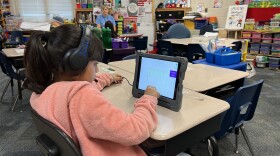The Kansas Board of Regents pressured state university officials to rethink hiking tuition, and the schools did just that.
In-state tuition for undergraduates at all state campuses will be flat or reduced after the regents approved revised rates Wednesday. Though some graduate and out-of-state students will see modest tuition increases.
Regents Chair Dennis Mullin thanked university officials for scaling back their tuition proposals, which he said comes with “punishment and pain.”
“I still fundamentally come down to the fact that we have to keep the cost of education as minimal as we can,” Mullin said.
The Legislature added $30 million for higher education to the state budget passed in May to make up for the cuts of recent years and further boost spending.
That prompted Mark Hutton, a member of the Board of Regents and a former state representative, to say last month that lawmakers could feel “betrayed” by tuition hikes now.
The flatter tuition, Hutton said Wednesday, will make it easier to ask for future state funding increases.
“So that we can continue towards holding the cost of our higher education in check,” he said.

After the warnings from the regents, the University of Kansas, Wichita State University and Emporia State University eliminated proposed resident undergraduate tuition increases. Tuition at KU’s Edwards campus will drop.
Kansas State University had been asking for the largest increase, at 3.1% for in-state undergrads, but scaled that back to 1.5%. To match the other schools, the regents voted to zero out the increase at K-State, as well.
Leaders from K-State said that could affect a strategic initiative to boost enrollment.
“We have some very real problems right now and I’m concerned about our ability to move rapidly forward to really address the enrollment problems,” K-State Provost Chuck Taber told the regents.
Staff from K-State said the university will still pursue the enrollment initiative, but it may require shifting money or cuts to other services.
Hitting the zero-increase target took some tough choices. University leaders told the regents that they would have to cut maintenance, mental health services and student aid.
But the regents wanted to send lawmakers a clear message: no tuition increases for in-state undergrads.
“I think it keeps the presentation cleaner,” Regents Vice Chair Shane Bangerter said Wednesday.
State support in fiscal year 2020 will still be about $25 million below where it was in 2009, according to the regents’ figures. As state funding lagged, money raised from tuition overtook state support as the greatest source of revenue for Kansas universities.
Kansas Senate Vice President Jeff Longbine, a Republican from Emporia, is glad lawmakers were able to put more money into higher education this year, regardless of whether it led to flat tuition.
“It had been a long time coming,” Longbine said. “I personally was okay with a modest tuition increase.”
The proposed increases presented last month were well below some past years when state support was leaner. Tuition hikes over the last decade sometimes ranged from 7% to 9%.
Longbine hopes the flat tuition won’t put universities in a tougher financial spot. Additional state funding boosts are not guaranteed.
“Each year has different variables,” Longbine said. “Each year has different circumstances based on our revenue and our budget.”
Tuition is a balancing act, according to student leaders from K-State, because they want to weigh the costs of college against maintaining the quality of the university. K-State student government had endorsed a tuition hike to fund services.
“Students saw the value added,” K-State Student Senate Speaker Hannah Heatherman said.
When it comes to affordability, Heatherman said there’s also the rising costs of student fees.
But even considering that, many students will welcome flat tuition.
“Students are going to be excited,” K-State Student Body President Jansen Penny said.
Stephen Koranda is Statehouse reporter for Kansas Public Radio and the Kansas News Service, a collaboration of KCUR, Kansas Public Radio, KMUW and High Plains Public Radio covering health, education and politics. Follow him on Twitter @kprkoranda or email skoranda (at) ku (dot) edu.
Kansas News Service stories and photos may be republished at no cost with proper attribution and a link to ksnewsservice.org.
Copyright 2019 KCUR 89.3







